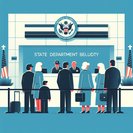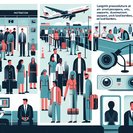
In a notice posted October 26, the U.S. Citizenship and Immigration Services (USCIS) formally invited public feedback on a proposed rule that would replace the random H-1B visa lottery with a weighted selection favoring employers who offer higher wages. The proposal—titled “Weighted Selection Process for Registrants and Petitioners Seeking to File Cap-Subject H-1B Petitions”—marks the most far-reaching overhaul of the specialty-occupation visa since the program’s creation in 1990.
Under the draft regulation, each electronic registration would receive between one and five “draw entries” depending on the Department of Labor wage level offered. Positions paid at Level IV (highest) would receive five chances; Level I jobs would receive only one. USCIS says the system would reward employers who truly face skills shortages, discourage ticket-splitting by low-salary consultancies and reduce the incentive to outsource.
For corporate mobility teams, the change could dramatically alter talent-acquisition strategies. Tech firms accustomed to blanket-registering thousands of candidates at the $70,000–$90,000 range may see their hit rates plummet, while higher-salary research labs and multinational finance houses could gain. Companies have until November 24 to file comments; a final rule could be published in early 2026 and may apply to next spring’s filing season.
Immigration lawyers are divided. Supporters hail the proposal as a merit-based fix that aligns with market realities. Critics warn it could disadvantage start-ups, non-profits and rural hospitals that cannot match coastal salary scales but still need foreign talent. They also predict new litigation over how prevailing wages are calculated and whether the department overstepped its statutory authority.
If adopted, the rule would sit alongside the Trump administration’s separate plan to levy a $100,000 filing fee on each H-1B petition—another policy that could reshape the cost-benefit analysis for employers relying on the visa.
Under the draft regulation, each electronic registration would receive between one and five “draw entries” depending on the Department of Labor wage level offered. Positions paid at Level IV (highest) would receive five chances; Level I jobs would receive only one. USCIS says the system would reward employers who truly face skills shortages, discourage ticket-splitting by low-salary consultancies and reduce the incentive to outsource.
For corporate mobility teams, the change could dramatically alter talent-acquisition strategies. Tech firms accustomed to blanket-registering thousands of candidates at the $70,000–$90,000 range may see their hit rates plummet, while higher-salary research labs and multinational finance houses could gain. Companies have until November 24 to file comments; a final rule could be published in early 2026 and may apply to next spring’s filing season.
Immigration lawyers are divided. Supporters hail the proposal as a merit-based fix that aligns with market realities. Critics warn it could disadvantage start-ups, non-profits and rural hospitals that cannot match coastal salary scales but still need foreign talent. They also predict new litigation over how prevailing wages are calculated and whether the department overstepped its statutory authority.
If adopted, the rule would sit alongside the Trump administration’s separate plan to levy a $100,000 filing fee on each H-1B petition—another policy that could reshape the cost-benefit analysis for employers relying on the visa.









